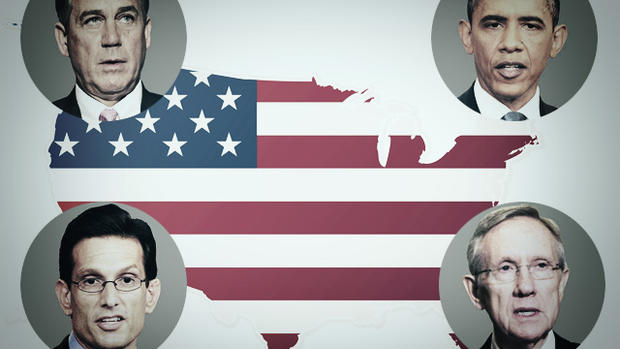Poll: Most Americans think debt deal should include spending cuts and tax increases
CBS News Poll analysis by the CBS News Polling Unit: Sarah Dutton, Jennifer De Pinto, Fred Backus and Anthony Salvanto.
Most Americans think any agreement on the budget and debt ceiling should include a combination of spending cuts and tax increases, according to a new poll from CBS News.
The survey, conducted from July 15-17, suggests that Americans side with President Obama on what a deal to raise the debt ceiling should include: the president has repeatedly called for tax increases for wealthy Americans, as well the elimination of tax loopholes that benefit corporate interests, to go along with spending cuts as part of a "balanced approach" to lower the government's deficit.
According to the poll, 66 percent of Americans believe that the deal to raise the debt ceiling should include both spending cuts and tax increases. Only 28 percent said they thought the deal should contain spending cuts exclusively, and a mere three percent wanted it to include tax increases only.
Poll: 71% shun GOP handling of debt crisisPoll: Support for debt ceiling increase doubles
Full poll (PDF)
Indeed, the desire to see an agreement that contains both elements spans the political spectrum: 55 percent of Republicans, 53 percent of Tea Party members, 71 percent of Democrats and 68 percent of Independents said they support such a plan.
Republicans and Tea party supporters, however, are more likely than Democrats and Independents to support an agreement that includes spending cuts only: 39 percent of Republicans and 44 percent of Tea Party members supported that option, whereas only 20 percent of Democrats and 28 percent of Independents did.
In a press conference on Friday, Mr. Obama argued that his proposal of a "balanced approach" on a debt deal - one that includes revenue increases as well as spending cuts - is what the American people want.
My Republican friends have said that they're not willing to do revenues, and they have repeated that on several occasions," he told reporters at a news conference at the White House. "My hope, though, is that they're listening not just to lobbyists or special interests here in Washington, but they're also listening to the American people. Because it turns out, poll after poll, many done by your organizations, show that it's not just Democrats who think we need to take a balanced approach, it's Republicans as well."
When it comes to finding fault for the budget standoff, it appears that Americans place more blame on Republicans in Congress than on the president. Forty-nine percent of voters said they faulted Republicans for politicians' failure to agree on a deal, while only 29 percent said they blamed Mr. Obama. Thirteen percent said both are to blame.
Views were similar during the budget standoffs in 1995 and 1996. Then, more Americans found the Republicans in Congress to be at fault than Former President Bill Clinton.
Obama issues veto threat against House GOP debt planSenate vows no breaks until debt deal done
Tom Coburn unveils $9 trillion deficit plan
Mr. Obama may receive less blame from the public because he is more likely to be seen as trying to resolve the problem, the survey indicates. According to the poll, sixty percent of Americans think he is genuinely trying to find a solution to the standoff, while just 32 percent say the same for the Republicans in Congress.
And while 56 percent of Republicans said they doubted Mr. Obama's commitment to finding a solution to the debt limit stalemate, 37 percent said they were skeptical that their fellow Republicans in Congress were really seeking a solution, either.
These views reflect similarities with voters' perspectives in 1996, during the budget standoff between Clinton and congressional Republicans, when 62 percent of Americans said they thought Clinton was trying to find a solution to the problem, and only 42 percent thought the same of Republicans in Congress.
Moreover, Americans generally seem to think that Mr. Obama is looking out for American families. Fifty-one percent of Americans say the president is more concerned than Republicans about doing what is best for their families; just 32 percent expressed the reverse opinion.
Regardless, Americans want to see compromise from all parties when it comes to striking a deal on raising the debt limit. Sixty-nine percent of Americans said they wanted Mr. Obama to compromise; 85 percent said they wanted congressional Republicans to compromise, and 78 percent said the same of congressional Democrats.
And while more Americans disapprove than approve of how Mr. Obama is handling the negotiations, he still receives less criticism from the public than does either party in Congress. Forty-three percent approve of how the president is handling the talks, and 48 percent disapprove. Approval drops to 31 percent when it comes to congressional Democrats' handling of the negotiations, however, and approval dips even further - to just 21 percent - when it comes to congressional Republicans (with 58 percent disapproving of congressional Democrats and 71 percent disapproving of congressional Republicans).
Even a majority of Republicans (51 percent) disapprove of how Republicans in Congress are handling the debt negotiations. Among Democrats, those figures are significantly lower: Only 32 percent disapprove of congressional Democrats' behavior in the talks, and only 22 percent feel the same about Mr. Obama's handling of them.
This poll was conducted among a random sample of 810 adults nationwide, interviewed by telephone July 15-17, 2011. The error due to sampling for results based on the entire sample could be plus or minus four percentage points. The error for subgroups is higher. This poll release conforms to the Standards of Disclosure of the National Council on Public Polls.


